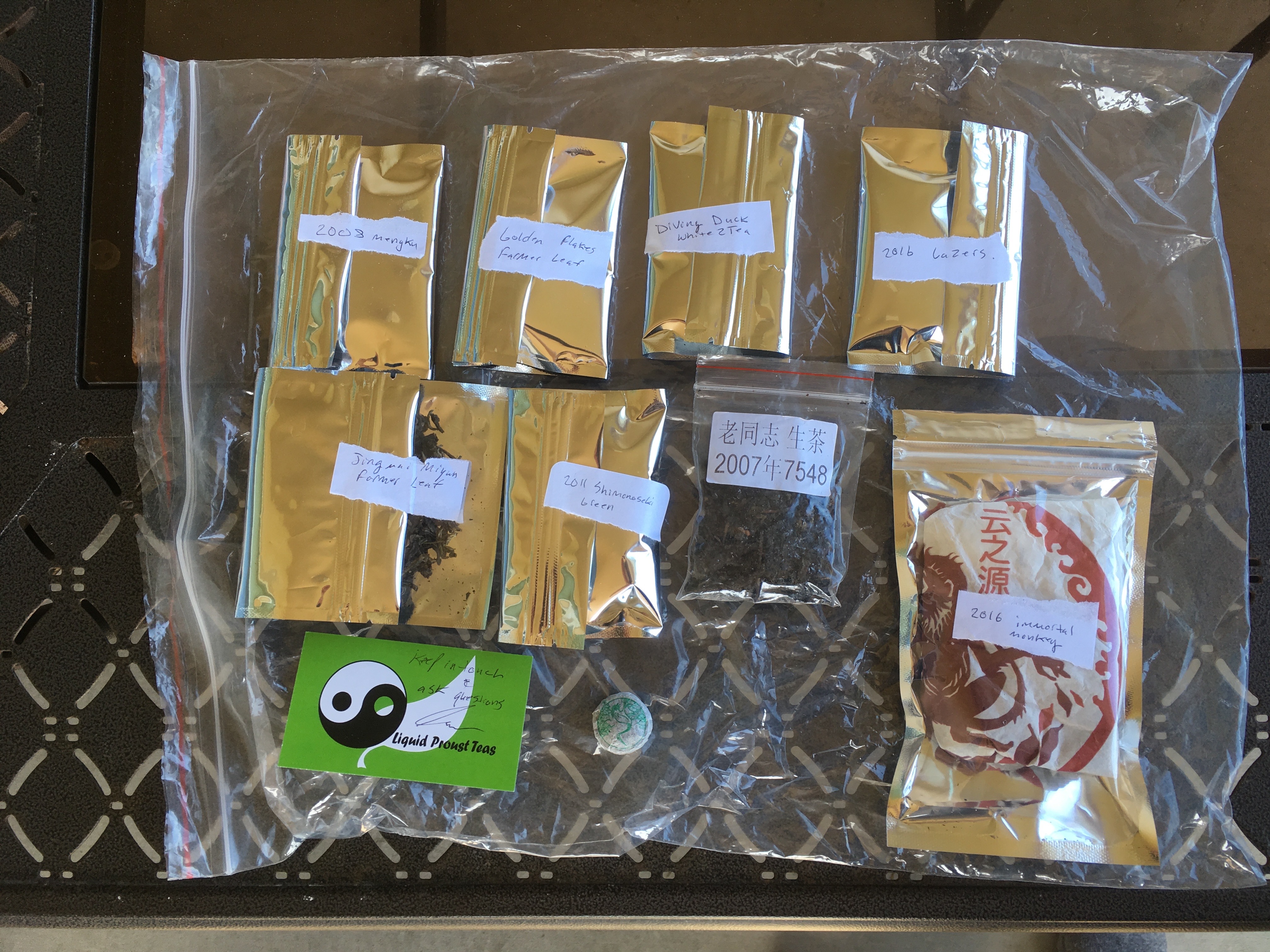Over the past two years or so, I've been starting to experiment with more than just the few green and black teas I've been in the habit of drinking. I'm extremely glad I have. As it turns out, tea offers an incredibly broad range of flavor profiles (even within a given "category" of tea, like green tea). But, so far, one thing I still haven't explored is Pu'er - a style of fermented tea originally from Yunnan, China.
Back in December, I happened across a Reddit thread started by Andrew Richardson, owner of Liquid Proust Teas. In his quest to spread knowledge and awareness of Pu'er, he offered a virtually free (~$5 for shipping/labor) sampler of Pu'er to anyone that responded. Naturally, I took him up on his generous offer!
On January 4, 2017, my package arrived:

Inside, I found:
- 2007 老同志 (Lao tongzhi) - Sheng, from Haiwan
- 2008 Mengku - Sheng, from Yunnan Sourcing
- 2011 Shimonoseki Green - Sheng, from Xiaguan
- 2016 Diving Duck - Sheng, from White2Tea
- 2016 Jingmai Yellow Flakes - Sheng, from Farmer Leaf
- 2016 Immortal Monkey - Shu, from Yunnan Sourcing
- 2016 Jingmai Miyun - Sheng, from Farmer Leaf
- 2016 Lazers - Sheng, from Liquid Proust
- An unidentifiable tea ball with a picture of a crane on it
Travel, work, and life have gotten in the way of my being able to sample everything in a timely fashion, but I can honestly say I've really enjoyed everything so far! I tried to take tasting notes on everything, but my taste buds are still pretty unrefined. So, instead of a full Steepster-style review for each of these, here are some general observations instead:
No, seriously, rinse the leaves.
I'd read that, when preparing Pu'er in a gaiwan, you should rinse the leaves twice. That seemed silly to me - why waste perfectly good tea? With other teas, the first few steeps can be rather strong, but my experience has been that you can control that with extremely short steep times and/or cooler water. I never rinse more than once and have never had a problem.
Turns out, for Pu'er, you really should rinse at least twice. The fermentation makes it so powerful that a proper steep time for the first couple of steeps would be impossibly short. Not rinsing means having a stupidly astringent cup that simply isn't worth drinking anyway. For older teas (like the "Mengku"), I also found the first 1-2 steeps (without having rinsed multiple times) tended to have a funny flavor (in this case, it was sour).
Enjoy a large number of steeps.
I'm used to re-steeping my tea leaves a number of times, but easily got 2-4x as much mileage out of the Pu'er. Getting 16-20 steeps or more was not uncommon. This was actually pretty surprising to me. I understood that Pu'er was going to be stronger than other tea, but I really didn't expect it to have more longevity for some reason.
Sheng is more complex than Shu.
I liked the Shu Pu'er that Andrew sent. The "Immortal Monkey", in particular, was very good. Shu seems to trend toward a deep earth- and/or stable-flavored brew with a little bit of bitterness. Each Shu had some variation on the theme (the tea ball with the crane on it became lightly smoky after a few steeps), but overall felt kinda uniform.
The Sheng Pu'er, however, tended to be far more varied and complex - especially over a number of steeps. Some, like the "Lazers", were very herbal with some sweet and floral (think honeysuckle) flavors. Others, like the "Diving Duck", were definitively in the stable and hay category like Shu. Even these wound up somewhere else after a few steeps, though (in this case, floral and somewhat grassy).
Andrew is awesome!
No, seriously. This was really cool. Not everything he sent me is going to be something I go out and buy for myself, but I really appreciated the opportunity to try a large variety of Pu'er for effectively no cost. I'm not sure if I'm ready to buy a ton of cakes and set up a location to age them all yet, but I'm very interested in exploring more of what Pu'er has to offer. Thanks!
